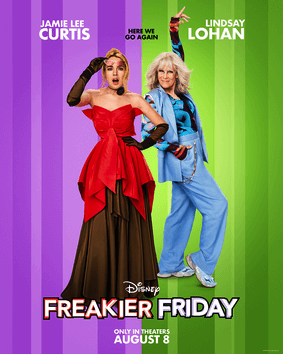The poster for Freakier Friday just floated past my timeline. It really does feel like the studios have simply given up on creating new and original work, and that even “original” work is tired and rundown. The new film, to be released this August, might well turn out to be brilliantly funny, but I’ll wait till it shows up on a streamer somewhere before I commit to watching it. I’ve had too many disappointments in the usual franchise-related fare to do more.
I get the anger and fear over AI in Hollywood, and writers are justifiably angry about their work being effectively plagiarised by the technology, or by studios trying to generate entire scripts with it. But, honestly: the movies don’t even need AI to be as bad as they are. In movies like Freakier Friday, they can just go back to the original scripts, add some mundane details about growing older, and throw in some quips about how “woke” everyone is (wink, wink!).
I recently watched what should have been at least a vaguely funny movie, with Reese Witherspoon and Will Ferrell, You’re Cordially Invited. I like romcoms when they’re done well (I’ve watched Bridget Jones more often than I can remember), and I had high hopes for this one, as I always enjoy anything with Ferrell—who at least incites joy in nearly every scene he’s in. But the writing was tired, Ferrell was vastly underused, and, honestly, I’m not sure if I finished watching it or not. I do remember groaning and lashing about, crying, “When is this over?”, so I suspect I carried on through till the end. Critics seem to have absorbed this kind of spiritless filmmaking as part of the new normal. In his review of the movie, Matt Zoller Seitz writes, about the two movie stars, “By this point in their respective careers, you know what you’re getting, especially if the project is a comedy, and if you like it, it’ll fill you up for a couple of hours. You’re Cordially Invited is reheated comedy leftovers, for the most part, but there’s enough warmth, sentimentality, and belly laughs to make for a raucous timewaster.” In other words, “Eh, so what.” This is a criminal position for a film critic to take. We can and should demand better from the movies.
I’ve written, in “A Gauntlet of Lesbians: In Praise of the Middlebrow,” that a movie doesn’t have to be either an art film or a massive blockbuster to count as worthwhile. But a middlebrow movie should also be absorbingly well written, with fleshed out characters and plotlines. Movies like Tower Heist (which I write about in “A Gauntlet”) or Tag take their audiences seriously, and both are hilarious and well crafted. The latter, about a group of grown men playing a lifelong game of, well, tag, keeps up the crackpot momentum, allowing us, in effect, to be inside the frenetic pace of onscreen events without ever losing track of the plot or characters. In contrast, You’re Cordially Invited is lazy and bloated, and it depends on the star power of its leads to carry it—which is an arrogant way to make a movie because it expects the audience to settle for second-rate writing. This is unfortunate because the premise—of two weddings scheduled on the same day and the mayhem that comes about—could have made for so much more, especially with Witherspoon and Ferrell at the centre.
Between such indifferently produced fare, IP-generated superhero movies, and franchise flicks like Freakier Friday, audiences are being admonished to just sit back and suck it up. “What more do you want from a movie,” we are asked, “Something, what, good?” In an economy where even critics think that aiming for an “Eh, meh, it was fine” review is an okay ambition for a movie, the problem for writers isn’t just that AI might take over their jobs. The much bigger problem is that they will be forced to write like AI.
If you like this, please consider supporting my work.

Don’t plagiarise any of this, in any way. I have used legal resources to punish and prevent plagiarism, and I am ruthless and persistent. I make a point of citing people and publications all the time: it’s not that hard to mention me in your work, and to refuse to do so and simply assimilate my work is plagiarism. You don’t have to agree with me to cite me properly; be an ethical grownup, and don’t make excuses for your plagiarism. Read and memorise “On Plagiarism.” There’s more forthcoming, as I point out in “The Plagiarism Papers.” If you’d like to support me, please donate and/or subscribe, or get me something from my wish list. Thank you.

